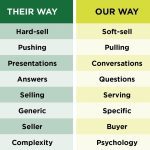Here’s How Much Your Disengaged Rural Sales Rep Is Costing You
Let’s do employee engagement by the numbers:
- 31% are Actively Engaged (which makes them super sales stars and talent-attracting assets)
- 21% are Actively Disengaged (who are killing your culture)
- 51% are Passive (who do just enough to get paid so you don’t fire them)
And according to global research company Gallup, the average disengaged employee will cost you a whopping 34% of their salary.
So let’s do some simple maths:
The average rural sales rep conservatively costs you $120,000 before additional benefits ie. truck/ute/car, insurance, diesel/fuel, laptop/iPad, phone, ACC and KiwiSaver.
You have 10 reps in your team which means an annual wage bill of $1.2 million.
Around 34% of them will be under-performing barely making target – if it all – and draining all goodwill from your management team at the same time.
This costs your rural business $408,000 (if you allow for all the business interruption and distraction, you might as well round it up to half a million dollars).
That’s a bloody big bill.
What’s worse is the average cost to replace and retrain a rural sales rep is 50% of their salary.
This takes into account the cost of separation costs, replacement costs, team absorption costs (whilst you wait for your next top talent to turn up), on-boarding costs, orientation costs and ramp time costs (which is an average of 6-9 months before they hit full speed – and that’s only for a good rep…).
Yet on the other side of the coin, an Engaged sales team member is:
- 87% less likely to leave you for your competitor
- Do double the amount of sales volume
- Secure more sales talent for you
This means it pays to focus on engaging rather than disengaging your rural sales team.
You can do this by catching them doing things right, rather than wrong.
You have to encourage them, reward them and recognise them when they are doing the good stuff like:
- qualifying (major) their calls before travelling (minor) to their calls
- using pre-call plans so they are prepared and planned to perform
- doing team role-plays and rehearsals ready for the real deal
- managing their territory in a smart way (punching the pockets), not a dumb way
Don’t let things fester if they aren’t performing.
Make sure you provide them with regular ongoing feedback on their performance. Bottling it up till their next performance review won’t help anyone.
Everyone who’s a decent professional wants to know if they are on track, and where they need to improve.
And if not, you’re there to help them, not criticise them.
So how do you fix disengagement?
The first step to fixing your engagement problem is acknowledging your disengagement problem.
The rules you put in place with good intent may actually be drivers of disengagement.
Once you’ve acknowledged this, the next step is to get make your team part of the solution:
- Could they help you find a way to cut down on the paperwork?
- Could they help you cut out all unnecessary meetings?
- Could they help you empower them to make more decisions vs. overwhelming you?
- Could they help you create the best sales support?
- Could they help you identify the specific sales training they need?
The #1 Driver of Disengagement
They say: “people don’t quit companies, they quit bosses.”.
And it’s true.
Only 22% of people leave because of pay.
57% of people leave because of their bad boss so you need to ask yourself:
- Are you or your Sales Manager a help or a hindrance?
- How do you know?
- Have you asked them to rate you using 360 feedback?
- Are you as open to feedback and scrutiny as they are when you do it to them?
- Are you an overly-aggressive ‘command and control’ bully boy? (dogs eventually bite back btw)
How you support and help each other will either hurt or help your bottom line.
And remember when you’re doing the appraisals, you’re being appraised to.
The next reason people leave jobs is a lack of flexibility.
My last job meant me being on a plane about 2-3 times a week missing countless school sports days – days I’ll never get back. Despite me asking fairly for flexibility – and the fact that I got home at 8.30-9pm after long 13-15 hour travel days – they expected me at my desk 8.30am the next morning “to set an example to others” as I was one of the highest paid member of staff.
I reminded them I was paid on my results and my market worth, not on the hours I worked.
Dark to dark work hours wasn’t working for me.
So I quit instead and set up my own business so I could have more control over my schedule. And now I get to more school sports days.
Disengagement Is Damaging
Now you know that 21% of your employees are actively disengaged and costing you 34% of their annual salary, it’s up to you and them to do something about it.
These guys and girls are culture killers who will damage your employment brand big time if you can’t turn things around.
You need to make them part of the solution, rather than part of the problem.
If they don’t get with the programme, you have to performance manage them up or out.
Disengaged sales people drive customers away. Because they don’t care, your customers won’t care either. They will leave you a company that does.
Research shows customers leave companies due to poor customer service (67%) and when disengaged teams have a higher error rate of 60% this leads to such poor, inattentive service.
And disengaged sales teams are always sick….absenteeism is rife in these ones.
Trust me when I say the longer you tolerate low disengaged performers, the faster you will lose your highest most engaged performers.
Don’t tolerate disengaged sales people after doing all you can. They are a cancer to your company and they send the wrong signal to everyone.
Make them someone else’s problem instead.
Empower Your Employees
Looking to your positive people, give your engaged and actively engaged rural sales team responsibilities before they are ready.
Give them special projects to signal what they are worth to you and your business.
That way they will feel valued and rewarded.
And remember: what gets recognised get repeated.
When you do have the data, be open and honest with it. Be transparent with your findings.
Don’t do a tick box exercise or you’ll end up further back in disengagement scores than you where when you started.
You must take action to make any contribution from your team meaningful.
If not, they will see it for the worthless “let’s keep HR happy” compliance exercise it is.
The commercial value of a highly-engaged rural sales team engagement is unquestionable.
The gains made in a more engaged team result in a much more significant return on investment, when compared to the costs:
Engaged rural sales reps will make over twice as many sales as their disengaged peers.
These numbers make it an absolute no-brainer if you want to maximise your rural sales team’s performance.
PS. If you want help on how to improve your sales team engagement we offer independent interviews that uncover the ideas and insights that unlock higher rural sales performance. Many clients who’ve completed these with us said they’d never get such honest findings on their own and are much better off because of it.
We’ll even help you recruit your next rural sales superstar.
+++
I am on a mission to help rural sales and marketing managers to get the results they deserve.
Please make sure you Follow Me here on LinkedIn so you don’t miss out on my articles. And if you want to talk to me direct and get some tools on how to manage your rural sales team better, grab your free 45-minute rural sales coaching call here.





